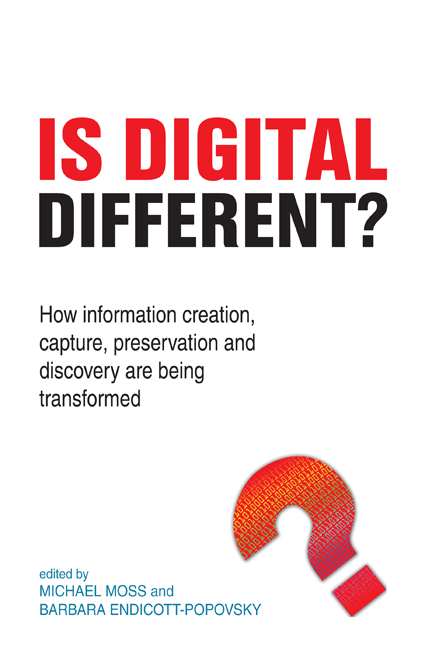 Is Digital Different?
Is Digital Different? Book contents
- Frontmatter
- Contents
- Contributors
- Introduction and acknowledgements
- 1 What is the same and what is different
- 2 Finding stuff
- 3 RDF, the Semantic Web, Jordan, Jordan and Jordan
- 4 Crowdsourcing
- 5 Pathways to integrating technical, legal and economic considerations in the design, development and deployment of trusted IM systems
- 6 Finding archived records in a digital age
- 7 Security: managing online risk
- 8 Rights and the commons: navigating the boundary between public and private knowledge spaces
- 9 From the Library of Alexandria to the Google Campus: has the digital changed the way we do research?
- Index
9 - From the Library of Alexandria to the Google Campus: has the digital changed the way we do research?
Published online by Cambridge University Press: 08 June 2018
- Frontmatter
- Contents
- Contributors
- Introduction and acknowledgements
- 1 What is the same and what is different
- 2 Finding stuff
- 3 RDF, the Semantic Web, Jordan, Jordan and Jordan
- 4 Crowdsourcing
- 5 Pathways to integrating technical, legal and economic considerations in the design, development and deployment of trusted IM systems
- 6 Finding archived records in a digital age
- 7 Security: managing online risk
- 8 Rights and the commons: navigating the boundary between public and private knowledge spaces
- 9 From the Library of Alexandria to the Google Campus: has the digital changed the way we do research?
- Index
Summary
Introduction
Reading about the future of digital humanities in London is a curiously illusory experience. Sit at a terminal in the London Library and you will read about digital manifestos and urgent discussions of the need for more training, better education and the need for a whole new approach to the humanities. Go outside and walk towards Piccadilly Circus, and you will see hundreds of ordinary Londoners engaging with the digital even as they walk along the streets or wait for underground trains. This is a profound change from 1989, when a short book, The Allure of the Archives (Farge, 2013), was published. An excellent book, it was republished in 2013. Though its historical and conceptual approach still strikes the reader as entirely modern, indeed postmodern, the world of research that author Arlette Farge outlines is from a different age. She describes sitting in cold and silent search rooms, ordering documents via paper slips and copying them out in long-hand. No presentday researchers would recognize this picture. From the institutional side, digitized catalogues, digitized and born-digital documents have transformed access; whilst on a personal level, digital cameras, laptops and tablets have transformed research capture.
The authors will explore this shift to a new digital space, and its implications for research, researchers, research resources and research methodologies. Following the authors’ experience, it will deal mainly with the humanities.
Content and access
The digital era has seen an explosion in the number and diversity of sources available to the researcher. This growth is manifest in multiple permutations. Whilst in 2009 Jisc (the Joint Information Systems Committee) announced its E-books for Further Education project to support the higher and further education sector, individual companies are releasing digital resources for research by all. For example, the New Connections project, which ran from 2011 to 2013, saw half a million images from the British Telecom (BT) archive catalogued, digitized and published online, representing 165 years of the history of ‘the world's oldest and most established communications company’ (Hay, 2014, 29).
- Type
- Chapter
- Information
- Is Digital Different?How information creation, capture, preservation and discovery are being transformed, pp. 189 - 212Publisher: FacetPrint publication year: 2015
